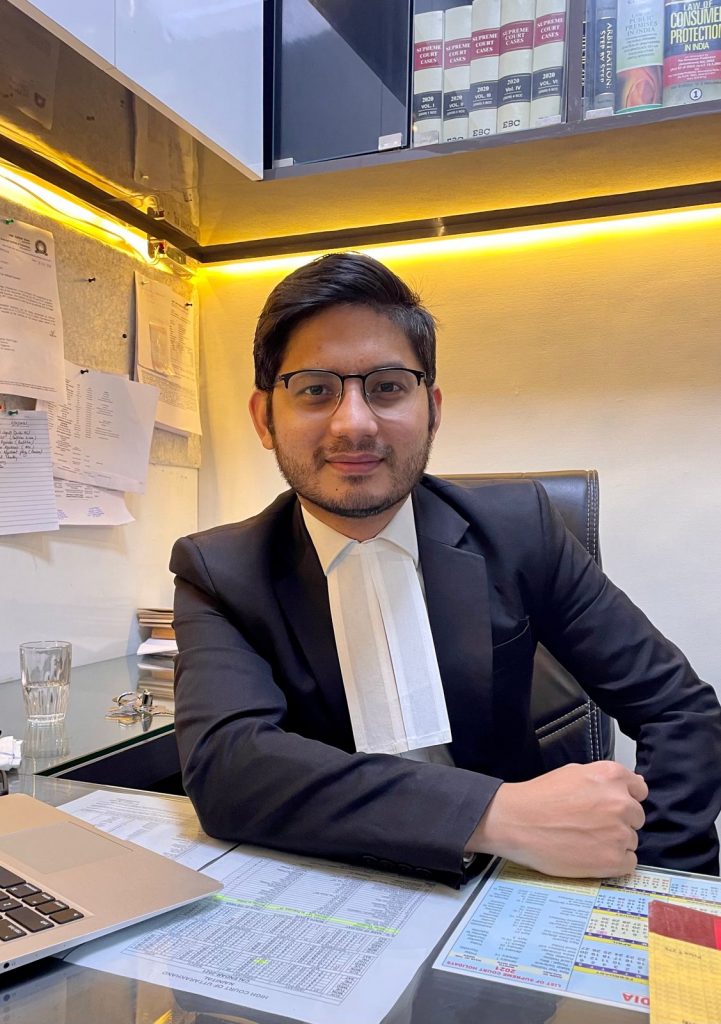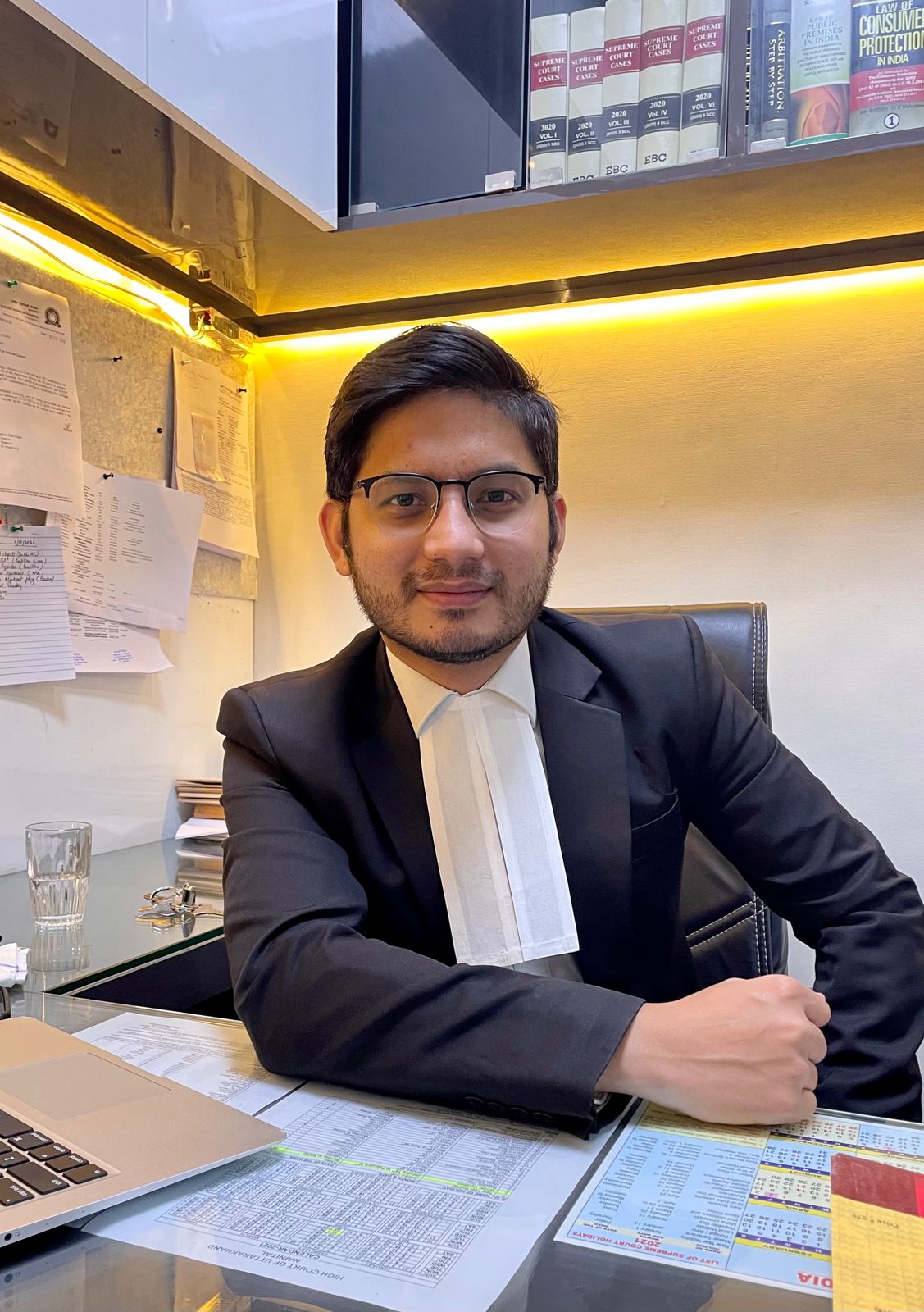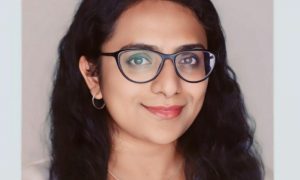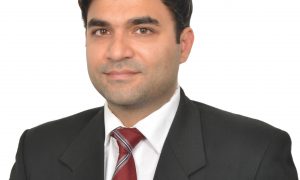This interview has been published by Namrata Singh and The SuperLawyer Team

Your family has a rich legal legacy, with your grandfather being the first Advocate General of Uttarakhand. How has this legacy influenced your journey as a third-generation lawyer, and what values or lessons have you carried forward from your family’s legal background?
I have always been around lawyers at my house and have had the opportunity to be inspired by my grandfather and my father. My grandfather always used to tell me that all I can give you is the family name and the rest is upon you what you make out of it, so till date, I’m trying to live up to his legacy and be a better lawyer every day. The lesson I have learnt is that hard work is the key to success no matter what generation you are if you don’t work hard you will not get work one needs to constantly keep working on his advocacy skills and perform better every day.
Transitioning from a small law firm to establishing your own practice is undoubtedly a significant step. Can you share a memorable experience or a turning point in your early career that shaped your approach to building your practice from the ground up?
I learnt the basics of drafting and working with a small team at the law firm. I still remember my senior used to always ask us where do you see yourself in 5 years and I told him that I see myself as an Advocate on Record at the Supreme Court of India, so that was my manifestation and somehow with the grace of god I could achieve it in my first attempt. Thereafter I started hustling and doing small matters at the trial court and kept working constantly at honing my drafting and argument skills. I would like to especially thank Adv Dattatrey Vyas who was my immediate senior in the law firm for constantly helping me by vetting my drafts and guiding me through the drafting process while I was at the firm and later when I was away. I think I was lucky to have good mentors like Adv. Anurag Tomar who gave me constant opportunities to argue and appear before various forums right from the beginning of my career which paved the way for me to argue matters before the Supreme Court of India. One of the few instances I remember is while arguing an admission matter before a division bench presided by Justice Gyan Sudha Mishra at the Supreme Court, it was a MACT matter and I argued all the aspects and informed the court about the injuries on the lower part of the left leg of the petitioner, the court after hearing me asked about the exact part of the leg and the nature of the injury which at that point of time was not very clear in the documents as there was some medical term used which was not known to me or the court. The court then passed over the matter to enable me to take instructions about the same and eventually when the matter was heard I was able to answer the query of the court and notice was issued in the matter. The lesson I learnt is that one has to be well prepared from all aspects of the file no doubt you may have read the file, but one has to be careful about every minute detail depending upon the nature of the case being argued.
You’ve been practicing law across various courts, including the Supreme Court of India and the National Green Tribunal. How do you manage the dynamics of different legal forums, and do you have a preference for any particular type of cases?
Practicing across various forums can be tiresome at times as we have a lot of running around to be done apart from the preparation for the matters to be argued at various stages. But having a good team of associates around who help ease the burden by holding the fort while I can travel from one court to the other at times. But yes we have over time developed an effective way of taking separate dates for various courts so there is no clash between cases. But I constantly motivate my juniors to start arguing applications before the trial courts or tribunals so that they build up the confidence and eventually pave way for them to start their own practise later in life. Though I am most comfortable at the Supreme Court of India, but yes I love appearing before trial court and have had the opportunity of appearing before Trial courts and High courts across states like U.P, Uttarakhand, Punjab etc. There is a whole lot of thrill in the process of cross-examination which I truly love about trial court advocacy which requires a different skill set especially compared to appellate court advocacy and appearing before trial court is always enriching.
As Counsel for the State of Uttarakhand at the National Green Tribunal, you’ve been involved in cases related to environmental issues. How does your role contribute to your personal commitment to environmental sustainability, and do you have any personal initiatives in this regard?
I have been on the panel of State of Uttarakhand at the National Green Tribunal, Principal Bench Delhi right from 2017 and have been appearing regularly. After the retirement of Retd Justice Swatatantra Kumar from the post of Chairperson the approach of NGT of dealing with matters had changed drastically as they started the process of letter petitions the filing of Original Applications came down drastically and reduced the role of counsels to a large extent which in one way made the court more accessible to the common man, but yes the role of state counsels and other counsels was reduced to very minimal until and unless a specific response was called from a particular authority on an issue. Rest we keep assisting courts as and when we are called upon to file Joint inspection reports or filing responses and explaining the stand of the authorities. Further with regard to my personal view on sustainability I as an individual try to save water and electricity and follow basic civic rules of not littering around on highways or public roads etc. I think if all the citizens of the country follow these rules strictly then our country will be a much cleaner place. I think awareness amongst people about waste management can take our country a long way towards environmental sustainability.
Balancing criminal trials along with civil trials is not common among lawyers. What motivated you to diversify into criminal trials, and how do you approach the unique challenges they present?
As I have already mentioned my love for trial court advocacy, especially the part of cross-examination of a witness, so I have done my fair share of civil trials and Criminal Trials under section138 Negotiable Instrument Act cases and had never thought of delving into criminal trials but, recently in 2021 one client approached me for conducting a criminal trial under POCSO Act at Ghaziabad Sessions court, after going through the file and as the matter was at evidence stage in the peculiar facts and circumstances I took up the matter and eventually the Prosecutrix a 11-year-old girl went hostile which led to the conviction of my client after the incarceration of 3 years. My experience in this trial was worth sharing first and foremost is the non-adhering to the basic principles of an In-camera trial as envisaged under the Section 37 of the Protection of Children from Sexual Offences Act 2012, though the same is followed to the teeth in the trial courts in Delhi, but I was shocked to see that the evidence of the prosecutrix including the examination in chief and the cross-examination was all done in open court.
After this trial, I have taken up a few more matters including a trial under SC/ST act before the Rohini Court and another matter under section 376/354 of the IPC on behalf of the accused before the Dwaraka Sessions Court. But, yes for the readers I have to clarify that while I have taken up these matters I did thorough research on the subject matters of these cases and did a lot of consultation with senior colleagues who have had long experiences in handling these matters before the trial court, it is very crucial that we know the finer nuances of such trials before we start conducting one as life and liberty of person depends on us.
Apart from this some basic things that I felt were a problem in other states was the lack of judicial infrastructure like stenographers for judges and in some courts, the courts even didn’t have a computer system. I think little changes in the whole justice administration system would affect the quality of the justice being delivered across all courts, especially trial courts.
Your 45-day judicial internship with Justice Dalveer Bhandari seems to have been a turning point. How did this experience influence your perspective on legal practice, especially in the Supreme Court, and set the course for your career?
The internship with Retd Justice Dalveer Bhandari is where it all started and it was my first experience at observing the practice and procedure at the Supreme Court of India. I along with my friend had the special privilege back then to join this internship as then the clerkship and the internship program was only for the students of the National Law Institutes and we would have had no chance at getting the internship if our Professor Ms Deesha Meshram had not provided us this opportunity. We were in our 8th Semester of 5-year Integrated law Course and had the basic knowledge of the subjects such as CPC, CRPC, Evidence etc, but this internship changed our perspective. During the internship our tasks included reading briefs of admission hearing matters and preparing a brief note and then finally presenting the matter before Justice Bhandari just like we do now in the Supreme court before the Hon’ble Judges, he would then ask us basic questions about the case about findings in the trial court judgement and things like issue involved etc. This exercise majorly helped me to see up close how the mind of a Supreme judge works and a brief idea of the kind of queries that can entail in a fresh matter. Our tasks also included providing the law clerk with research materials in the after-notice matters apart from observing the matters that we had briefed sir on being argued in court. It was truly an enriching experience and it was only after this internship that I made up my mind about settling down in Delhi and practising before the Supreme Court of India. Some of my positive takeaways from this internship were learning the basic skill of reading an SLP and the relevant papers, preparing a note and relevant case research on the subject matter and knowing how the synopsis and list of dates play a very crucial role in the fate of the matter before the Supreme Court.
You’ve represented organizations like the National Institute of Technology, Srinagar (Garhwal), and provided litigation support to companies on a retainer basis. How do you navigate the dual role of legal advisor and litigator, and what challenges and rewards come with this multifaceted approach to legal practice?
Over the span of 12 years of being a litigator i have had the opportunity to represent many corporations and companies before various courts some of them would be Uttarakhand University, NIT Uttarakhand,Transunion CIBIL, Carnival Cinemas etc. the key to working with big organisations and corporations is timely delivery of work and adhering to high professional standards. I completed my 1-year Post Graduate Diploma in Entrepreneurship Administration and Business Laws from NUJS, Kolkatta in 2016 which helped me equip myself with practical skills related to business laws. Later in time, I ventured into providing my services on the advisory side related to Contract Drafting and allied services related to day to day functioning of the companies so that the companies could avoid or at least try to keep their disputes and litigation to the minimum. Time management and organising the work schedule between courts and the advisory work is the key to balancing the work between both the fields and rest having a good team to assist me helps me a lot. The benefit of playing the dual role of litigator and legal advisor helps one to broaden one’s horizon and then you are never short of work.
In addition to your legal responsibilities, you’ve represented the Cricket Association of Uttarakhand. Are you an avid cricket fan yourself, and if so, do you have a favourite cricket memory or player that you hold dear?
I like the game of Cricket and follow all the major tournaments, IPL etc., but no I have not played cricket at any level as such. I have been appearing for the CAU before Uttarakhand HC, District Courts and before the Hon’ble Ombudsman which is an internal dispute mechanism at the Association. Associating with the CAU has also been a great learning experience in getting to know the nuances involved in the cricketing field and kind of dispute and the resolution process before the Ombudsman which all is done in terms of the Constitution of the Association which is framed under the aegis of BCCI.
Clearing the AOR exams is a significant accomplishment. How has being an Advocate on Record at the Supreme Court impacted your career, and what advice would you give to aspiring lawyers aiming for a similar milestone?
As I mentioned earlier, clearing the AOR Exam was my dream from the day I started practising because I had fair knowledge about the role that is played by an AOR in the Supreme Court of India through my previous internship experience with Retd Justice Dalveer Bhandari. Nowadays we see a lot of people who have not practised at the Supreme Court or intend to practice at Supreme Court think that it’s crucial for one to be an AOR to appear before the Supreme Court which is not the case. The fact of the matter is merely clearing AOR exam doesn’t help one start practise at Supreme Court, but yes my advice would be that one should join some chamber and get to know the basic procedures of the court and functioning of the court and then try to clear the exam it would really help to make the mark may be in your first attempt. Further with regards to the exam I would advise all those who are preparing to start with the Supreme Court Rules and practising drafting petitions on paper as with the advent of computers we are more used to typing on our laptops you may be thorough with drafting but it’s really a difficult task when comes to doing the same manually, so the key is to try and time yourself in solving the previous year’s drafting problems that will give you an edge while you write your paper. My last word of advice is that try and keep the presentation of your answer neat considering the time you have to write the paper and answer all the questions.
Get in touch with Ayush Negi-


























